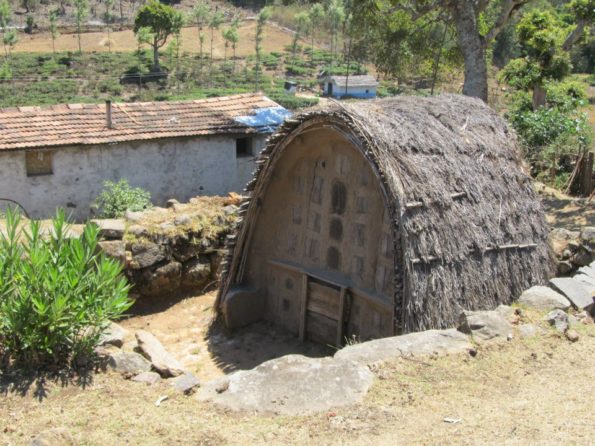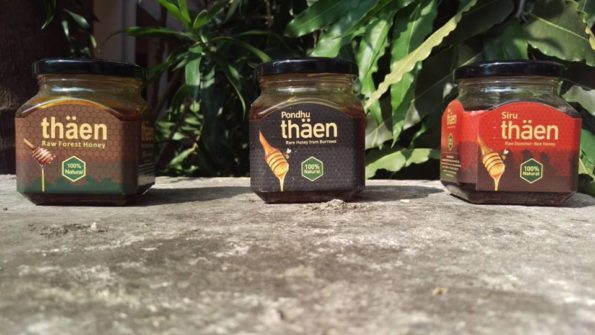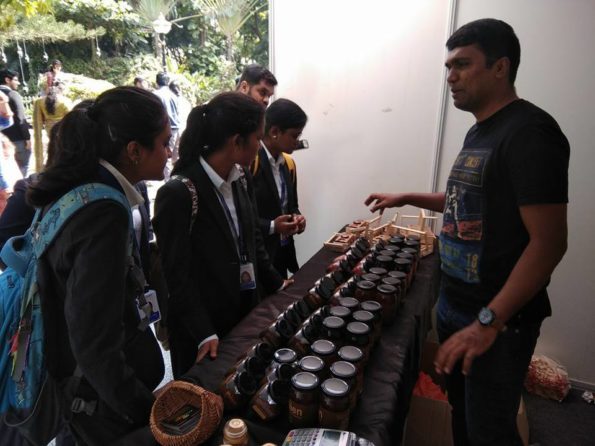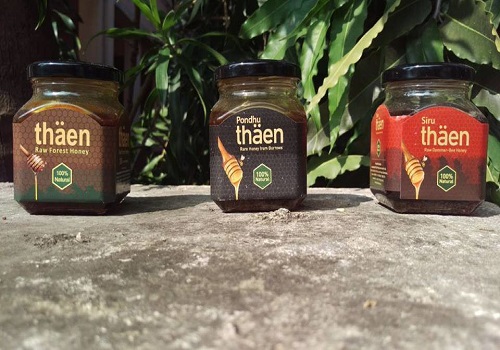Raw forest honey
“What is the cost of this wild collected honey? How do you determine the cost or the value of something like this.“- Sridhar Lakshmanan asks the audience in his TEDx Shillong talk “God’s Own Backyard” while showing the image of a precarious honey collector from the Maliyur region on a cliff, sans any safety equipment. Sridhar Lakshmanan is the CEO of ecoLogin– a for-profit enterprise which promotes products made in rural and tribal regions, and the Managing Trustee of Basecamp- an NGO which provides skill development and undertakes social and developmental projects to improve the lives of the communities ecoLogin supports. I spoke to Sridhar about ecoLogin’s venture promoting wild honey- Thäen, and the difficulties of bringing these products of value to the urban consumer.
The Honey Factor
ecoLogin, Sridhar shares began as an alternate tourism initiative to increase awareness about remote locations in Tamil Nadu which are blessed with nature’s bounty and natural experiences but are often not considered “touristy”. The company was incubated in IIT Madras along with his friend Arul Sekar. Through the connections that were made in this endeavour, the team sought to create a market for goods and services from the tribal communities that live in many of these remote areas. Thäen, which literally translates to honey is a brand under this umbrella. Thäen sources wild honey from healthy beehives, which is tested for quality, unfiltered and minimally processed.
“We work with a remote village called Malaiyur where about 1000 people reside. It is situated between Madurai and Dindugal, and to reach the nearest community one has to trek for almost 1.5 hours. An IIT Kanpur alumnus stayed with the people in this village to understand what are the opportunities available to them. One of the things that came out of that was honey. Initially, we tried different things- we gave them honey boxes, we sent them for training. Then one fine day I brought about 200 Kgs of honey with me. One of my friend who had just started his venture selling organic and natural produce gave me some space in his godown to store the honey. I was trying to see how I could sell this product when he approached me and asked if he could sell it at his store. That’s when we saw that honey was literally flying off the shelf. We realized that there is potential for honey. One thing led to another, and we created the brand Thäen. Today we have about 8 to 10 sources, and we are also trying to include more sources across the country,” says Sridhar.

Image Courtesy: ecoLogin Facebook Page
Sweet, not so sweet, but valuable
One of the things that made me approach the team behind Thäen in the first place was the description of their products. Stop by the Thäen shop and you will see honey from Nilgiris which is sour, honey from the same region which is bitter and a creamy honey from Kodaikanal. “There is also honey that is so bitter that you almost start puking once you taste it, and we have tasted it,” says Sridhar as he talks about nuances in a product we generally describe in one word- sweet. “We have tasted different flavours of honey and honey depending on the source does come with a lot of strong flavours. There is a honey we are trying to source which is white in colour and has a mild sweet taste. In March-April honey from the Meghalaya region has a natural orange flavour.These are wild products, so there are no standards. People are often surprised by these flavours. They tell us this is the first time I am tasting something like this. Honey is a unique natural product. For example, the stingless bee honey or the Siru Thäen has a natural fruity flavour, and the bee itself separates the larvae, pollen and honey. This honey is crystal clear. The tribals, in fact, give this honey to their infants.”
@sridharlakshman of ecoLogin and Basecamp talks about flavours of honey and sourcing them for a bigger purpose. Click To TweetWhile there is intrigue when it comes to a product of this nature, Sridhar shares that people are also sometimes skeptical. ” Consumers like wild, and straight from the source- but they are also scared about adulteration. How do I believe you?- is the most common question. I don’t have a straightforward answer for that. The problem is that many times gimmickry takes precedence over facts. People tell you all kinds of tests for honey, like ants won’t consume adulterated honey or dogs won’t lick it. There is a standardized test for honey and only that gives you the right result. “
“I truly believe that a product speaks for itself, and we have seen that with Thäen. When you consume raw honey, there will be certain properties that consumers can easily pick on. There will be an aftertaste; the flavour will be rich. This is also the only honey you can use with ayurvedic products. Ayurveda forbids the use of heated honey and all the honey in the market is pasteurized. Typically young kids and older people love our products. Kids especially love the taste and flavour, and they don’t feel like going back to commercial honey. Many of our repeat sales happen this way. “

The other side of a beehive
Honey is just one aspect of Thäen and ecoLogin. What the team aspires to do is to create better opportunities and facilities for the communities they interact with. While it sounds easy and straightforward, Sridhar says the reality is anything but that. “We face many structural and social hurdles, and the process is definitely not straightforward. It takes time to understand their language and build a rapport with them. We have been trying to create change for the last 6-7 years, and we are now seeing some progress.”

Sridhar also adds that they often find that money which is given to these communities does not reach their womenfolk, and the team is finding ways to make them an equal part of this change. “We are planning to float a producer company wherein people who gather will be represented. Once we form the company, we hope to involve women in the collection, storage and drying of honey, giving them a share of the earnings.” He shares that these communities have been functioning a certain way for generations and intervening often requires finding a balance between the two worlds. “We don’t want to be the typical middlemen.We strive towards greater responsibility and greater transparency. We want people to know that there is a person pledging his life on the other end. That’s so hard to convey to the consumer. It is a risky process. Of course, we have tried providing them with safety gears and training them on safety measures, but we also need to understand that these are strong traditional practices.We cannot magically change things. The only way to move forward is to respect that, go along with them and set safer standards for the next generation so that the culture continues but with better measures.”
For more information visit https://thaen.in/.
